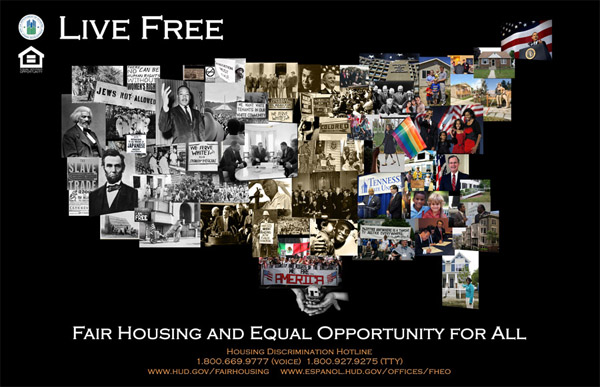Long Island celebrates the 50th anniversary of the Fair Housing Act
from 2019
Within a week after the tragic April 1968 assassination of Dr. Martin Luther King Jr., the Fair Housing Act, Title VIII of the Civil Rights Act of 1968 was passed. En Español.
If you believe that you have been discriminated against in seeking housing, please call Long Island Housing Services at 631-567-5111 ext. 375 to speak to a trained Fair Housing Investigator or Advocate or email info@LIFairHousing.org.
Si usted cree que ha sido discriminado al buscar vivienda, llame a Long Island Housing Services al 631-567-5111 ext. 378 para hablar con un investigador o defensor de vivienda justa capacitado. También puede enviar un correo electrónico a info@LIFairHousing.org.
More Fair Housing resources can be found here
(Other videos on the Fair Housing Act and Fair Housing)
In concert with state and county laws, Long Islanders are protected against housing discrimination based on:
- Race“I don’t think it’s safe for you to live here because of your disability”
- Color
- National Origin
- Religion
- Sex “Wouldn’t you be more comfortable somewhere else?”
- Disability
- Familial Status
- Marital status“I don’t rent to families with children.”
- Age (over 18),
- Sexual orientation
- Military status“No Programs accepted”
- Creed
- Source of Income“I don’t want foreigners living in my complex;”
- Arrest
- Gender Identity or Expression
In addition Suffolk County residents are protecting against housing discrimination based on:
- Alienage or citizenship“I’m terribly sorry, but….”
- Veteran
- Domestic Violence Victim
Advertising and Marketing
Discriminatory housing advertisements are illegal under the Fair Housing Act and other federal civil rights laws. Note that in HUD’s housing programs, certain types of affirmative fair housing marketing are required by federal law.
What Is Prohibited?
In nearly all housing, including private housing, public housing, and housing that receives federal funding, the Fair Housing Act prohibits the making, printing and publishing of advertisements that indicate a preference, limitation or discrimination because of race, color, religion, sex, disability, familial status, or national origin. The prohibition applies to publishers, such as newspapers and directories, as well as to persons and entities who place real estate advertisements in newspapers and on websites. It also applies where the advertisement itself violates the Act, even if the property being advertised may be exempt from the provisions of the Act. Other federal civil rights laws may also prohibit discriminatory advertising practices.
Examples of advertising that may violate the Act include phrases such as “no children,” which indicates discrimination on the basis of familial status, or “no wheelchairs,” which indicates disability discrimination.
What Type of Affirmative Fair Housing Marketing May Be Required?
Federal law requires that applicants for participation in HUD’s subsidized and unsubsidized housing programs pursue affirmative fair housing marketing policies. This is to help ensure that individuals of similar income levels in the same housing market area have a like range of housing choices available to them regardless of their race, color, religion, sex, disability, familial status, or national origin.
Filing a Complaint
If you believe you have experienced housing discrimination involving advertising or marketing, you can file a complaint with HUD.
Additional Resources
- HUD Fair Housing Act Advertising Guidelines (former 24 C.F.R. part 109 regulations)
- Memorandum on Guidance Regarding Advertisements Under § 804(c) of the Fair Housing Act
- Equal Housing Opportunity Graphics for Printing
Fair Housing Rights and Obligations
Learn more about the many fair housing laws enforced by FHEO and how those laws can help you.
It is illegal to discriminate in the sale or rental of housing, including against individuals seeking a mortgage or housing assistance, or in other housing-related activities. The Fair Housing Act prohibits this discrimination because of race, color, national origin, religion, sex, familial status, and disability. A variety of other federal civil rights laws, including Title VI of the Civil Rights Act, Section 504 of the Rehabilitation Act, and the Americans with Disabilities Act, prohibit discrimination in housing and community development programs and activities, particularly those that are assisted with HUD funding. These civil rights laws include obligations such as taking reasonable steps to ensure meaningful access to their programs and activities for persons with limited English proficiency (LEP) and taking appropriate steps to ensure effective communication with individuals with disabilities through the provision of appropriate auxiliary aids and services. Various federal fair housing and civil rights laws require HUD and its program participants to affirmatively further the purposes of the Fair Housing Act.
HUD’s Office of Fair Housing and Equal Opportunity (FHEO) works to eliminate housing discrimination and promote civil rights and economic opportunity through housing. FHEO enforces fair housing laws. One of its roles is to investigate complaints of housing discrimination. If you believe you have been discriminated against in violation of any of these federal fair housing laws, you can file a complaint with FHEO.
Learn More About…
- The Fair Housing Act
- Non-Discrimination in Housing and Community Development Programs
- Rights of Persons with Disabilities
- Sexual Harassment
- Discrimination in Mortgage Lending
- Rights of Families with Children
- Nondiscrimination in Advertising and Marketing
- Housing Discrimination and Persons Identifying as LGBTQ
- Rights of Persons with Limited English Proficiency
- Affirmatively Furthering Fair Housing
The National Fair Housing Alliance (NFHA)has high quality Public Service Announcement (PSA) materials on their website.
People who believe that they have experienced housing discrimination who live in Nassau or Suffolk Counties, can contact Long Island Housing Services at 631-567-5111 ext 375 or email info@lifairhousing.org. You can find out more about our Fair Housing enforcement program here. Also see Fair Housing Laws protect Immigrants, Refugees, and People of all Religious Faiths.








Social media and google translate